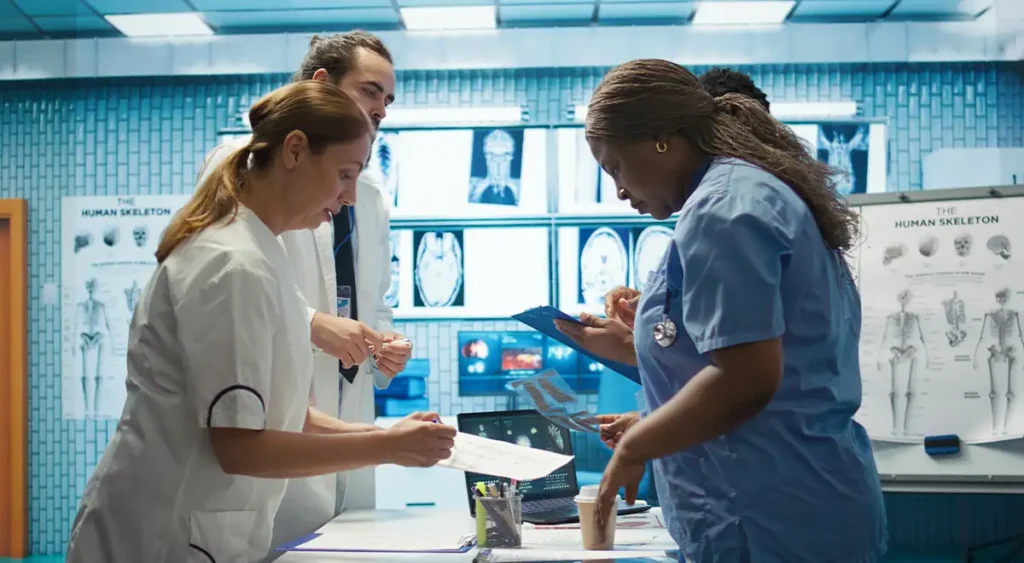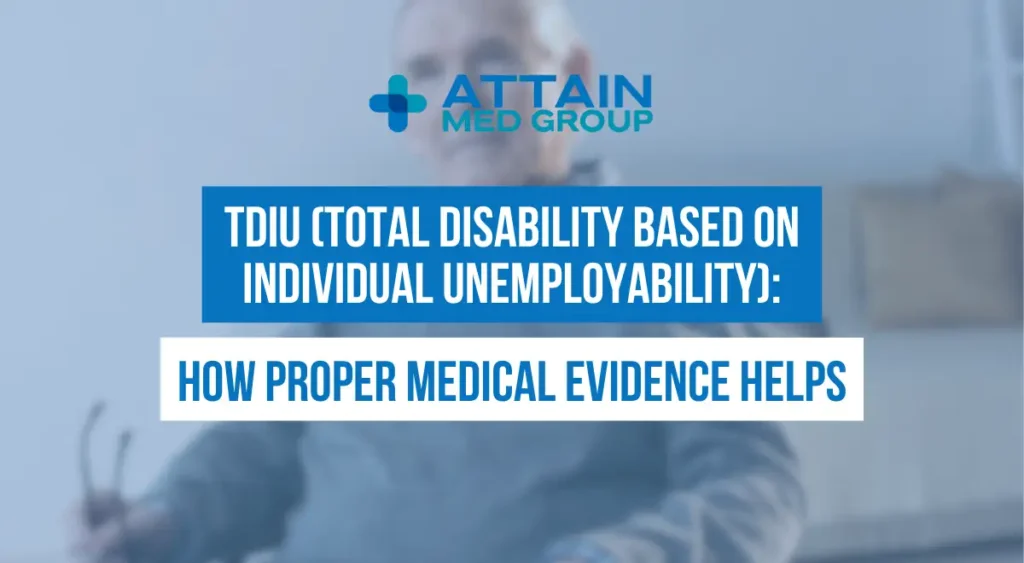TDIU (Total Disability Based on Individual Unemployability) can be a game-changer for veterans struggling to work due to service-connected disabilities. But getting approved isn’t always easy. The key? Solid medical evidence that clearly shows how your conditions impact your ability to hold down a job. Let’s examine how proper medical documentation can make or break your TDIU claim.
What is TDIU and Why Does It Matter?
Total Disability based on Individual Unemployability, often called TDIU or IU, is a critical VA disability benefit. It allows veterans to receive disability compensation at the 100% disability rate, even if their combined schedular rating does not reach 100%. This benefit is specifically for veterans whose service-connected conditions prevent them from securing and following substantially gainful employment.
Essentially, TDIU acknowledges that certain service-connected disabilities, or their combined effects, can make maintaining a job impossible, regardless of the specific percentage assigned by the VA rating schedule. Gaining these unemployability benefits can provide significant financial stability for veterans unable to work. Receiving TDIU benefits means achieving the highest compensation level available for va disability.
To qualify, you generally need to meet specific schedular rating requirements or potentially qualify on an extraschedular basis. For schedular TDIU, a veteran typically needs one service-connected disability rated at 60% or more, OR multiple service-connected disabilities with a combined rating of 70% or more, with at least one condition rated at 40% or more. However, the core requirement remains proving that your service-connected disabilities prevent you from maintaining substantial gainful employment.

Understanding Substantially Gainful Employment
The VA defines substantially gainful employment as work that is not marginal and provides earnings above the federal poverty level for a single person. Marginal employment, conversely, involves earnings below this poverty threshold. Proving you cannot maintain substantial gainful employment because of your service-connected disability is central to any TDIU claim.
This means demonstrating that your disabilities prevent you from performing the physical or mental tasks required by occupations, leading to inability to secure or keep a job that pays a living wage. It’s not just about being unemployed; it’s about being unemployable due to your service-connected conditions. Your work history can be relevant evidence here.
Obtaining these individual unemployability benefits often requires navigating a complex process. You will likely need to submit specific VA forms, such as VA Form 21-8940 (Veteran’s Application for Increased Compensation Based on Unemployability). Accurate and thorough medical evidence is vital throughout this process.
The Uphill Battle: Common TDIU Claim Challenges
Securing TDIU is often challenging for veterans making TDIU claims. The VA might not fully appreciate the severity or frequency of your symptoms based solely on standard medical records. They might underestimate how your service-connected conditions genuinely affect your daily functioning and ability to work in a typical work environment.
Common hurdles include insufficient documentation connecting your health issues directly to your inability to work. Relying only on Compensation and Pension (C&P) exams can also be problematic, as these brief evaluations might minimize your actual limitations. Sometimes, the VA adjudicators might misunderstand how multiple conditions interact and compound limitations.
These obstacles can lead to frustration and potentially a denied VA disability claim. Many veterans find their initial applications for TDIU disability benefits are denied, requiring appeals. Knowing how to present compelling evidence is therefore very important for success.
Your Strongest Asset: Rock-Solid Medical Evidence
Compelling medical evidence is arguably the most critical factor in a successful TDIU claim. Strong, detailed medical proof directly addresses the core issue: how your service-connected disabilities prevent gainful employment. It can shift a rating decision from denial to approval.
Let’s review the types of medical evidence that carry significant weight with the VA:
1. Independent Psychological Evaluations
Mental health conditions like PTSD, depression, anxiety, or TBI frequently impact a veteran’s ability to maintain employment. An independent psychological evaluation from a qualified psychologist or psychiatrist offers detailed insight beyond standard treatment notes. This type of medical evidence can be very persuasive.
These evaluations should thoroughly document how symptoms (e.g., panic attacks, hypervigilance, difficulty concentrating, memory problems, social anxiety) affect daily activities and workplace functioning. They can explain why specific job requirements or work environments (like interacting with supervisors or the public, meeting deadlines, handling stress) are untenable. An expert opinion linking symptoms directly to occupational limitations is invaluable for your TDIU benefit pursuit.
2. Functional Capacity Evaluations (FCEs)
For physical disabilities, an FCE provides an objective assessment of your physical capabilities related to work tasks. Conducted by physical or occupational therapists, FCEs measure abilities like lifting, carrying, sitting, standing, walking, reaching, and manipulating objects. These expert reports quantify your limitations.
The results offer concrete data demonstrating precisely what you can and cannot do physically over a typical workday. This objective evidence can counter assumptions made during brief C&P exams. FCEs provide specific details about limitations (e.g., cannot sit for more than 30 minutes, limited ability to lift over 10 pounds) that directly relate to job requirements.
3. Nexus Letters: Connecting the Dots
A nexus letter, written by a medical professional familiar with your case, explicitly links your service-connected conditions to your inability to maintain substantial gainful employment. This is often a crucial piece of evidence, bridging the gap between diagnosis and functional impairment. A strong nexus letter strengthens your argument for individual unemployability benefits.
The letter should detail the specific symptoms and limitations stemming from your service-connected disability (or disabilities) and explain, using medical reasoning, why these prevent you from working. It’s most effective when written by a provider who has treated you long-term and understands your full medical history and work history struggles. This medical evidence helps clarify the connection for the VA adjudicator.
4. Treating Physician Opinions
Opinions from your regular doctors, specialists, or therapists who treat your service-connected conditions carry significant weight. They see you regularly and understand the chronicity and severity of your symptoms day-to-day. Ask them to document specific ways your conditions limit work-related activities.
Their treatment notes should consistently reflect the symptoms and limitations you experience. Encourage them to provide detailed statements about your ability to perform tasks like concentrating, interacting socially, adapting to stress, or maintaining regular attendance. Consistent documentation over time is powerful.
Why Cookie-Cutter C&P Exams Aren’t Enough
The VA heavily relies on its own C&P exams when making a rating decision for disability compensation. However, these examinations are often brief, conducted by examiners unfamiliar with your history, and may not capture the full scope of your disability. Relying solely on a C&P exam can be detrimental to your TDIU claim.
C&P examiners might not observe how your symptoms fluctuate; you might have a “good day” during the exam that doesn’t reflect your typical state. They may focus on individual conditions in isolation, failing to consider the combined impact of multiple service-connected disabilities. The short duration often prevents a deep understanding of how your conditions realistically affect your ability to sustain work.
Therefore, supplementing the VA’s C&P exam results with independent medical evidence, like the evaluations and letters discussed above, is often necessary. This provides a more complete and accurate picture of how your service-connected conditions prevent you from working. Veterans should actively gather supporting medical records.
Painting the Full Picture: Symptoms and Work Impact
Your submitted medical evidence must clearly connect your diagnosed conditions and symptoms to specific work-related limitations. It’s not enough to just list diagnoses; the evidence must explain the functional consequences. Make sure the documentation thoroughly covers key areas.
Describe specific symptoms, their frequency, severity, and duration (e.g., chronic back pain preventing sitting/standing for prolonged periods, anxiety causing panic attacks during stressful meetings, cognitive issues from TBI hindering focus and task completion). Explain how these symptoms directly interfere with essential work functions like concentration, attendance, interaction with others, physical demands, or pace. Detail any accommodations tried and why they proved insufficient.
Also, include information about medications, their required dosages, and any side effects (like drowsiness, fatigue, cognitive fog) that further impede your ability to work. All this information helps the VA understand why maintaining substantial gainful employment is not possible for you due to your service-connected disability rated condition.
Beyond Medical Records: Other Helpful Evidence
While robust medical evidence forms the foundation of a TDIU claim, other supporting documents can strengthen your case significantly. Consider including these elements along with your medical records:
- Detailed work history: Document frequent job changes, periods of unemployment, reasons for leaving jobs (especially if related to your disabilities), and any performance issues caused by your conditions.
- Lay Statements: Submit statements from yourself (VA Form 21-4138, Statement in Support of Claim), family members, friends, or former coworkers who have witnessed how your disabilities affect your daily life and ability to work. These personal accounts can add valuable context.
- Statements from Former Employers: If possible, obtain letters from past employers describing difficulties you had performing job duties, attendance issues, or accommodations provided due to your service-connected conditions.
- Vocational Expert Reports: A vocational expert (VE) can analyze your medical limitations, work history, age, and education to provide an opinion on your ability to perform any type of substantially gainful employment available in the national economy. These expert reports can be very persuasive, especially in complex cases or when appealing a denial.
- Social Security Disability Records: If you have been approved for Social Security Disability Insurance (SSDI) or Supplemental Security Income (SSI) based on the same conditions, submitting the Social Security Administration’s decision and supporting medical evidence can be helpful, although VA makes its own separate determination based on its criteria. The standard for social security disability differs from the VA’s standard for TDIU.

The Power of Personalized, Detailed Documentation
Generic medical notes often lack the specific details needed to win a TDIU claim. You need documentation that clearly outlines your functional limitations in occupational terms. Evidence should be tailored to show exactly how your service-connected disabilities prevent you from meeting the demands of substantially gainful employment.
This is where specialists or organizations experienced in VA disability law and claims can make a difference. For example, Chisholm Chisholm & Kilpatrick (CCK Law), a leading veterans law firm, has extensive experience helping veterans develop the evidence needed for TDIU claims. They understand what the VA looks for and how to present medical facts effectively.
Such firms often work with medical and vocational experts to obtain the necessary evaluations and reports. Their familiarity with VA processes and disability law, sometimes even having shaped veteran disability law through landmark cases, allows them to build strong cases for veterans seeking individual unemployability benefits, especially after a denied va claim.
Avoiding Common Pitfalls in Medical Evidence
Presenting the right evidence is crucial, but avoiding mistakes is equally important. Certain issues with medical documentation can weaken or even derail your TDIU claim. Be mindful of potential problems.
Watch out for inconsistencies between different medical reports or statements. Ensure that descriptions of your symptoms and limitations are consistent across all submitted evidence. Avoid vague statements that don’t explicitly connect your condition to specific work limitations; phrases like “patient feels unwell” are less helpful than “patient reports chronic pain preventing standing for more than 15 minutes.”
Make sure your evidence is current and reflects your present condition and inability to work. Outdated reports might not accurately represent your current level of impairment. Always review all evidence before submitting it to the VA to catch any potential red flags or areas needing clarification.
Timing is Everything: When to Submit Medical Evidence
Don’t delay gathering and submitting your supporting medical evidence. Ideally, you should compile comprehensive documentation early in the TDIU claims process, even before officially filing VA Form 21-8940 if possible. Proactive evidence gathering allows time to address gaps.
Starting early provides sufficient time to schedule independent evaluations like FCEs or psychological assessments, request detailed reports or nexus letters from treating physicians, and obtain lay statements or employer information. This preparation helps avoid delays and strengthens your initial submission. Remember, the effective date for TDIU benefits can sometimes be linked to when the VA receives evidence showing unemployability, making timely submission potentially impactful.
Even if you have already filed your claim, you can and should continue to submit relevant medical evidence as it becomes available. The VA has a duty to assist, but providing strong evidence yourself significantly improves your chances. Strong evidence helps establish the earliest possible TDIU effective date.

The Long-Term View: Ongoing Medical Documentation
Receiving TDIU is a major step, but it’s important to remember that it isn’t always permanent. The VA can periodically re-evaluate your condition and employability status, especially if medical improvement is considered possible for your service-connected conditions. Maintaining consistent medical treatment and documentation is key.
Continue attending regular medical appointments for your service-connected disabilities. Ensure your providers consistently document your ongoing symptoms, limitations, and their impact on your daily functioning. Having continuous medical records helps demonstrate that your inability to work persists.
If the VA notifies you of a potential reduction or review of your TDIU status, be prepared to provide updated medical evidence confirming that your service-connected disabilities still prevent you from maintaining substantial gainful employment. Staying proactive with your medical care safeguards your disability benefit.
When to Seek Professional Help
The process for obtaining VA individual unemployability benefits can feel complex and difficult. If you feel overwhelmed, unsure about the required evidence, or have encountered obstacles, seeking assistance from experienced professionals is a sensible step. Consider getting help in certain situations.
Reach out if you are uncertain about what specific medical evidence is needed for your conditions or how to obtain it. If your initial TDIU claim has been denied, or you believe you were wrongfully denied VA benefits, professional help is highly recommended. Managing claims involving multiple service-connected disabilities often benefits from expert guidance.
Veterans Service Organizations (VSOs) offer free assistance, while accredited attorneys or claims agents specializing in veterans law, such as those at an appellate firm like Chisholm Chisholm Kilpatrick, can provide representation, often working on contingency (no fee unless you win). A knowledgeable law firm can help navigate the VA system, gather crucial expert reports, and appeal unfavorable rating decisions, significantly improving your chances of success, especially if dealing with denied VA disability.
Conclusion
TDIU (Total Disability Based on Individual Unemployability) offers vital support for veterans whose service-connected conditions prevent them from working. However, securing these individual unemployability benefits hinges heavily on presenting the right medical evidence. Strong, detailed documentation is your most powerful tool in demonstrating your inability to maintain substantial gainful employment.
It’s not merely about the volume of medical records; it’s about the quality and specificity of the evidence showing how your service-connected disabilities prevent work. Focus on obtaining evaluations, nexus letters, and detailed physician statements that connect your conditions directly to functional limitations. By strategically building your case with compelling medical proof, you significantly increase your likelihood of receiving the TDIU disability benefits you earned through your service.

